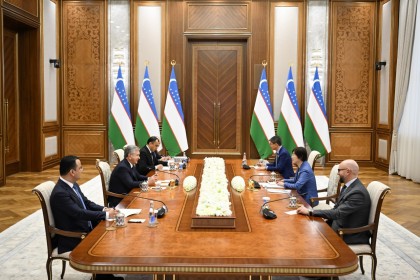President Shavkat Mirziyoyev on Saturday signed Priority Measures for Liberalizing Foreign Exchange Policy Decree allowing from September 5 to legal entities in Uzbekistan to buy foreign currency in banks without restrictions for payments under current international operations (import of goods, works and services, repatriation of profits, repayment of loans, payment of travel expenses and other transfers of non-trade nature).
The decree established that only market mechanisms will be used when setting the soum to foreign currency exchange rate.
Natural persons - residents of Uzbekistan from this date can freely buy and sell foreign currency in bureaux de change and in exchange offices of banks with currency transferred to international bank cards and use them abroad without any restrictions.
Unincorporated private entrepreneurs engaged in imports of consumer goods are allowed to purchase foreign currency to bank accounts just like individuals.
The requirement of mandatory sale of foreign currency proceeds for exporters, regardless of their form of ownership, is now canceled.
Unincorporated private entrepreneurs, as well as farms that have foreign currency proceeds, can withdraw cash foreign currency from their bank accounts.
The decree specifies that in the territory of Uzbekistan it is forbidden to make payments in foreign currency for goods, works and services, except payments with international bank cards in accordance with international practice.
Prices and tariffs for goods, works and services, as well as minimum requirements to the authorized capital of companies shall be set only in the national currency.
State duties, fees and other mandatory payments are accepted in soums only, with the exception of consular fees.
In the decree it is acknowledged that "excessive administrative regulation in foreign currency circulation has created an inefficient system of privileges and preferences for some industries and business entities, has led to unequal conditions for doing business and violations of market principles and has become a retarding factor for attracting foreign investments, increasing exports of goods and services, and for the country's economic development in general."
"Ensuring the rights of natural and legal persons to freely buy and sell foreign currency and dispose of their own foreign currency at their own discretion" is named in the decree as one of the main priorities of national economic policies in the field of liberalization of the foreign exchange market.
"Enhancing the role of market instruments in the use of foreign exchange resources, creating equal competitive conditions for all economic entities, enhancing the stimulative role of monetary policy in boosting exports in non-traditional sectors and strengthening regional and international economic cooperation" have also been set as priority areas.
Commission rate for purchase and sale of foreign currency shall be set by banks themselves, as well as the terms for issuing and repaying loans in foreign currency. The risks related to foreign currency purchase and sale transactions are classified as entrepreneurial risk, and their management becomes the responsibility of a bank;
The decree also abolished the practice of issuing a license to banks to conduct operations in foreign currency. These operations are now carried out on the basis of the common license for banking activities.
The government was instructed, in a week's time, to draft measures to mitigate the effects of currency policy liberalization, including measures to ensure financial stability of the banking system, financial support for basic industries, optimize rates of customs duties and strengthen state support for socially vulnerable segments of the population. In particular, in 2017-2018, it is planned to increase the number of recipients of benefits among families with children under the age of 14 on average by 1.5 times and recipients of material assistance among low-income families on average by 2 times.











